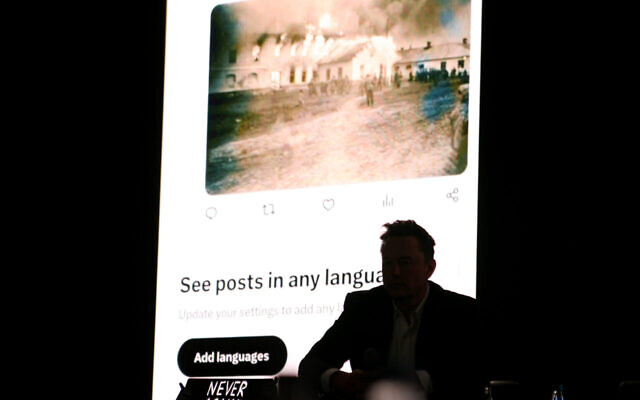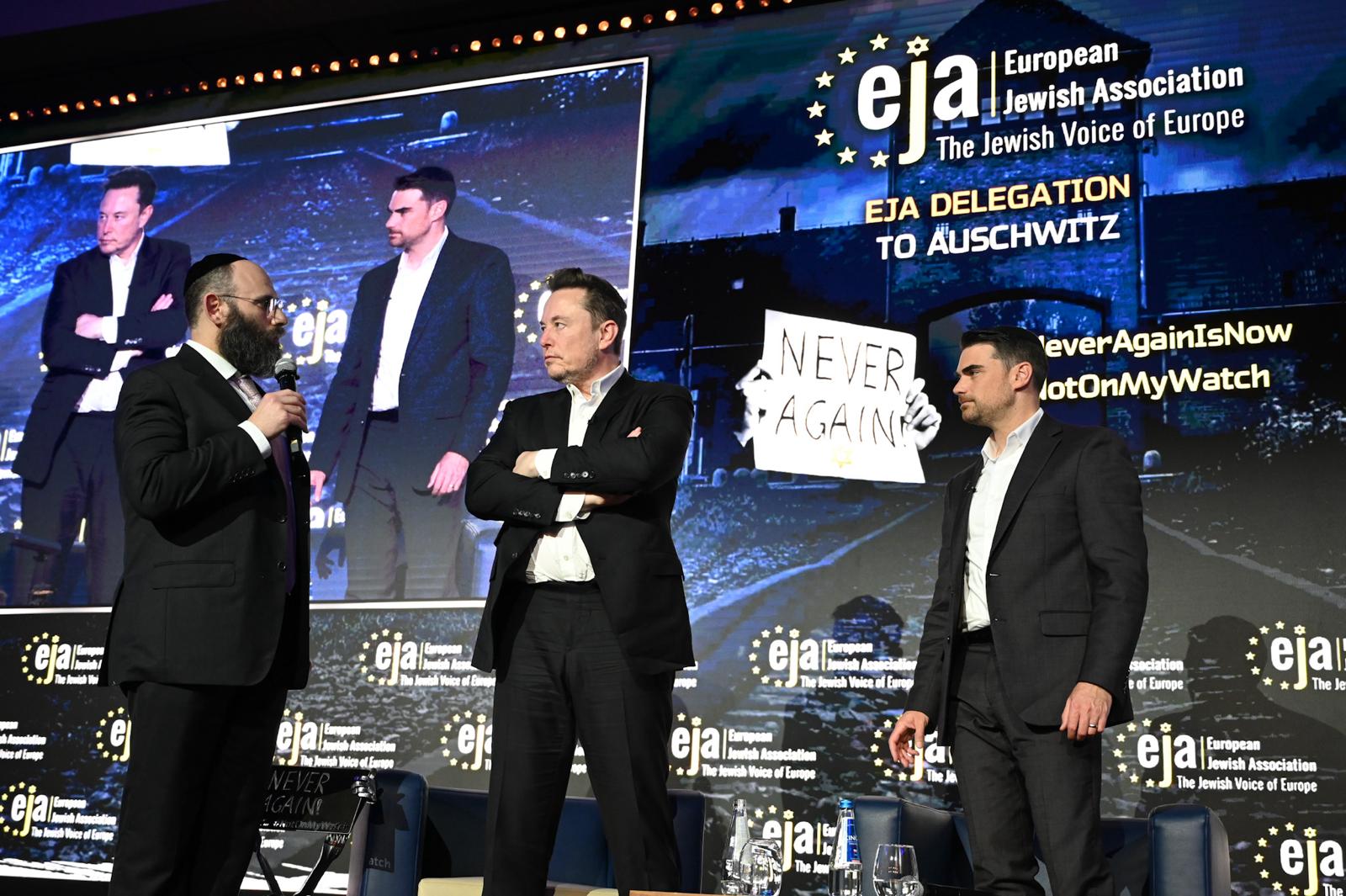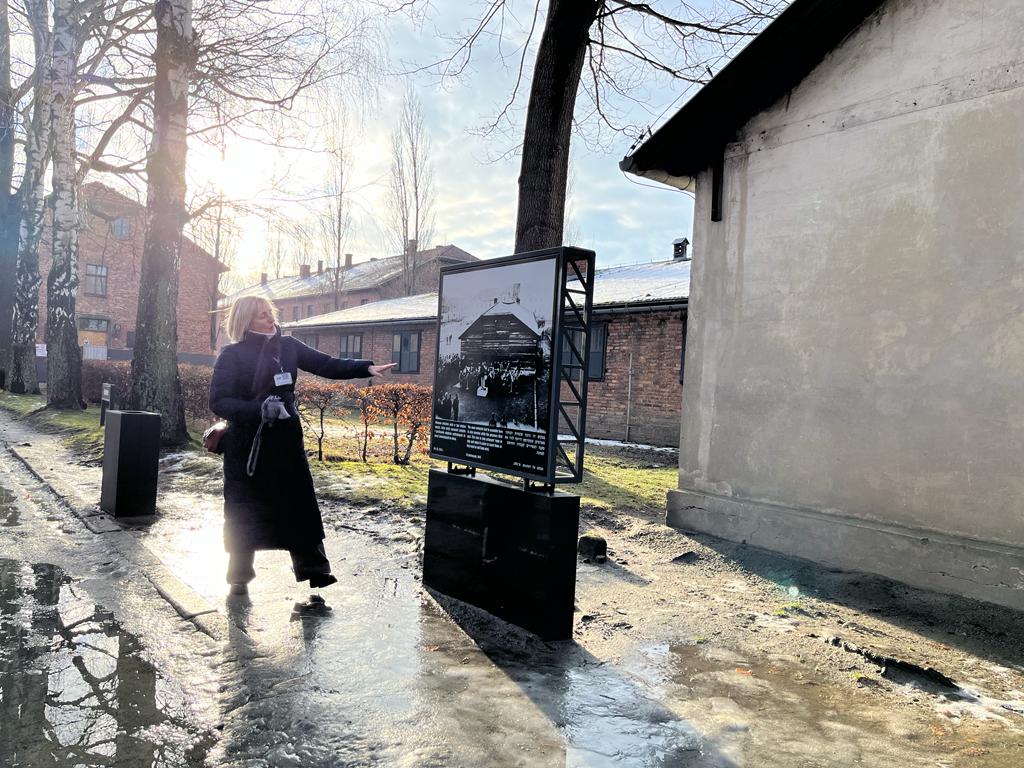Could social media really have stopped the Holocaust?
Scholars say Elon Musk’s ‘fantasy scenario’ of Twitter/X preventing the Shoah is far-fetched.

Gavriel Rosenfeld, president of the Center for Jewish History in New York City, specialises in Nazi Germany and counterfactual history — or the study of what might have happened, but didn’t.
So when Elon Musk claimed this week that the Holocaust could have been mitigated if only X, his social media platform, had existed at the time, Rosenfeld took notice.
He said Musk’s comments stood out as a textbook example of a “fantasy scenario in which history turns out better thanks to an alteration of some key variable — in this case, transporting present-day technology into the past.” Such arguments are called “Connecticut Yankee counterfactuals,” he said, in homage to the 1889 Mark Twain novel in which a contemporary man is transported to England during the reign of King Arthur.
“This fantasy is a self-serving one,” Rosenfeld told the Jewish Telegraphic Agency. “It enables [Musk] to switch the conversation away from his allowing right-wing antisemites to post freely on X — which have increasingly discredited his platform — by claiming it would have served a social good if — and it’s a big if — it had existed 80 years ago.”
Rosenfeld was one of several Holocaust scholars to challenge Musk’s comments, which he said on Monday during a conversation with conservative commentator Ben Shapiro at a conference in Krakow hosted by the European Jewish Association.
Musk’s trip to Poland came as he has become embroiled in a series of antisemitism-related controversies. In November, Musk came under fire for endorsing an X post that said Jewish communities push “hatred against whites.” (The tech mogul replied, “You have said the actual truth.”) He has also threatened to sue the Anti-Defamation League, a Jewish civil rights group, over its objections to hate speech on X. The website has seen antisemitic content spike since Musk took charge.
In his comments, Musk said X could have deterred the Nazis by making their mass murder “impossible to hide” and allowing “freedom of speech” against them.

His remarks were broadly praised during the event, which gathered European politicians and right-leaning Jewish leaders to discuss the global threat of antisemitism after Oct. 7. Among the billionaire’s most vigorous supporters was EJA Chairman Menachem Margolin — an influential European rabbi affiliated with the Chabad Hasidic movement — who asserted that X “could have saved millions of lives” during the Holocaust.
But Rosenfeld and other scholars say Musk’s imagined version of history demonstrates a misunderstanding of the genocide.
“The problem with Jews was not that they didn’t have the information, the problem was they didn’t have options,” said Doris Bergen, a Holocaust historian at the University of Toronto and scholar-in-residence at the U.S. Holocaust Memorial Museum. “Where were German Jews supposed to go? Who was providing refuge for elderly people, people with disabilities, and others deemed not valuable as workers?”
Bergen noted that half of Germany’s Jews — those who had the contacts and resources needed to escape the Nazi regime — actually did leave the country between 1933 and 1939. Those included Anne Frank’s family, who went to the Netherlands. But the Nazis caught up with them after occupying that country in 1940, as they did with the Jews in Poland, Hungary, France, the Soviet Union and the other nations they invaded.
“What would social media have done for these people, who in many cases were killed at the same time as the Germans invaded?” asked Bergen.

Musk argued on Monday that Nazi Germany represented the dangers of regulating speech, saying, “One of the first things the Nazis did when they came in is they shut down all the press and any means of conveying information.”
That is another inaccuracy, said Bergen, who suggested that Musk “take an intro course on the Holocaust.”
“Germany had a lot of newspapers that kept going all the way through the Nazi period,” she said. “Definitely there was pressure to conform to the ‘party line,’ but it was not so simple as controlling all the media.”
International media, including the Jewish Telegraphic Agency, also covered what was happening in Germany and elsewhere in Europe under the Nazi regime but did not ignite adequate international concern to stop the genocide.
Christopher Browning, a Holocaust scholar at the University of North Carolina at Chapel Hill and the author of “Ordinary Men,” about a Nazi death squad, also said information was available — but its availability was simply not enough to prevent the atrocities.
“Much about the Holocaust traces not to lack of information but unwillingness to process into knowledge,” said Browning. “Wishful thinking, denial and inability to imagine the unprecedented all played a role among victims, perpetrators, and bystanders.”
Historians have also pointed out that the Nazis were masters of using existing media to press their case against the Jews, suggesting that in this alternate universe, the Nazis might have weaponized social media as well — as countries today have been accused of doing in their internal and external conflicts.
David Myers, a professor of Jewish history at the University of California, Los Angeles, called Musk’s comments “ludicrous” and “offensive,” questioning why the owner of X overlooked his company’s power to swiftly disseminate hate and violence across the world. In fact, Myers said, social media might have made it easier for Nazis to find their local allies across Europe.
“Every day people gather online with like-minded souls to express their shared hatred for groups including Jews, Muslims, Blacks, Asians, and LGBTQ people, among others,” he said. “Moreover, these hate-mongers can receive detailed guidance online on how to carry out a massacre.”
Musk addressed the EJA conference after privately touring Auschwitz-Birkenau, a trip lauded by attendants of the conference. Margolin told JTA he believes that Musk has a better understanding of antisemitism and Jewish trauma after that visit.
However, an Auschwitz tour guide and Holocaust educator was skeptical of Musk’s claim that X could have deterred the Nazis. Social media only reflects the complexity of human nature at the heart of a genocide, which is what must be reckoned with, she told JTA.
“Social media works both ways,” said Agnieszka, who declined to share her last name. “It can generate really good generosity among people, make them really empathetic and loving toward others. But on the other hand, the same social media is able to gather people who are full of hatred.”
For Rosenfeld, the scholar of alternate histories, Musk’s counterfactual opened the doors to other scenarios that could have increased, not decreased, the dangers faced by European Jews.
“Given how popular opinion of the current war [in Gaza] has been decisively shaped by video footage shot on personal devices, it’s likely that the Allied war against Nazi Germany would have been more difficult to prosecute had there been daily images of German civilians being incinerated in Allied bombing raids,” he said, noting that some conservatives made this point in the 1970s about media coverage of the Vietnam War.
But all of the possibilities of the past, Rosenfeld said, are secondary to the role that Musk’s counterfactual thinking plays in the current day.
“From my perspective,” Rosenfeld said, “the key function of Musk’s counterfactual assertion is to rehabilitate his social media platform by investing it with hypothetical virtues — all the while deflecting attention away from its real world liabilities.”

Thank you for helping to make Jewish News the leading source of news and opinion for the UK Jewish community. Today we're asking for your invaluable help to continue putting our community first in everything we do.
For as little as £5 a month you can help sustain the vital work we do in celebrating and standing up for Jewish life in Britain.
Jewish News holds our community together and keeps us connected. Like a synagogue, it’s where people turn to feel part of something bigger. It also proudly shows the rest of Britain the vibrancy and rich culture of modern Jewish life.
You can make a quick and easy one-off or monthly contribution of £5, £10, £20 or any other sum you’re comfortable with.
100% of your donation will help us continue celebrating our community, in all its dynamic diversity...
Engaging
Being a community platform means so much more than producing a newspaper and website. One of our proudest roles is media partnering with our invaluable charities to amplify the outstanding work they do to help us all.
Celebrating
There’s no shortage of oys in the world but Jewish News takes every opportunity to celebrate the joys too, through projects like Night of Heroes, 40 Under 40 and other compelling countdowns that make the community kvell with pride.
Pioneering
In the first collaboration between media outlets from different faiths, Jewish News worked with British Muslim TV and Church Times to produce a list of young activists leading the way on interfaith understanding.
Campaigning
Royal Mail issued a stamp honouring Holocaust hero Sir Nicholas Winton after a Jewish News campaign attracted more than 100,000 backers. Jewish Newsalso produces special editions of the paper highlighting pressing issues including mental health and Holocaust remembrance.
Easy access
In an age when news is readily accessible, Jewish News provides high-quality content free online and offline, removing any financial barriers to connecting people.
Voice of our community to wider society
The Jewish News team regularly appears on TV, radio and on the pages of the national press to comment on stories about the Jewish community. Easy access to the paper on the streets of London also means Jewish News provides an invaluable window into the community for the country at large.
We hope you agree all this is worth preserving.





















